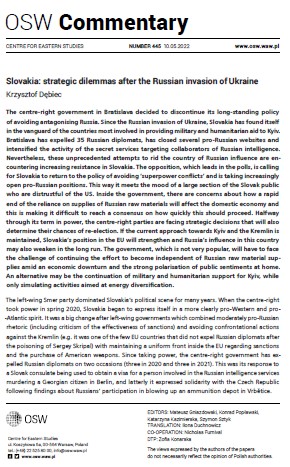Slovakia: strategic dilemmas after the Russian invasion of Ukraine
Slovakia: strategic dilemmas after the Russian invasion of Ukraine
Author(s): Krzysztof Dębiec
Subject(s): Government/Political systems, International relations/trade, Political behavior, Geopolitics, Peace and Conflict Studies, Russian Aggression against Ukraine
Published by: OSW Ośrodek Studiów Wschodnich im. Marka Karpia
Keywords: Slovakia; Russian invasion of Ukraine; raw material supplies; military and humanitarian aid to Kyiv;
Summary/Abstract: The centre-right government in Bratislava decided to discontinue its long-standing policy of avoiding antagonizing Russia. Since the Russian invasion of Ukraine, Slovakia has found itself in the vanguard of the countries most involved in providing military and humanitarian aid to Kyiv. Bratislava has expelled 35 Russian diplomats, has closed several pro-Russian websites and intensified the activity of the secret services targeting collaborators of Russian intelligence. Nevertheless, these unprecedented attempts to rid the country of Russian influence are encountering increasing resistance in Slovakia. The opposition, which leads in the polls, is calling for Slovakia to return to the policy of avoiding ‘superpower conflicts’ and is taking increasingly open pro-Russian positions. This way it meets the mood of a large section of the Slovak public who are distrustful of the US. Inside the government, there are concerns about how a rapid end of the reliance on supplies of Russian raw materials will affect the domestic economy and this is making it difficult to reach a consensus on how quickly this should proceed. Halfway through its term in power, the centre-right parties are facing strategic decisions that will also determine their chances of re-election. If the current approach towards Kyiv and the Kremlin is maintained, Slovakia’s position in the EU will strengthen and Russia’s influence in this country may also weaken in the long run. The government, which is not very popular, will have to face the challenge of continuing the effort to become independent of Russian raw material supplies amid an economic downturn and the strong polarisation of public sentiments at home. An alternative may be the continuation of military and humanitarian support for Kyiv, while only simulating activities aimed at energy diversification.
Series: OSW Commentary
- Page Count: 5
- Publication Year: 2022
- Language: English
- Content File-PDF

